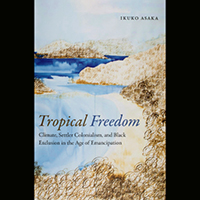
CHAMPAIGN, Ill. — The narratives of black emancipation and white settlement are usually separated in U.S. and Canadian history, but they are actually intertwined, says a University of Illinois history professor.
That’s because every significant emancipation of black enslaved people – from the Revolutionary War through the Civil War and after – came with efforts to move the freed people off the continent.
Temperate climates were for white people and tropical for black, went the thinking, and the British, Canadians and Americans all engaged in it, according to Ikuko Asaka. “Black exclusion and white settler colonialism went hand in hand,” she said.
Thus the title of her new book about this history: “Tropical Freedom.”
Much of this “climatic determinism” came from a desire by whites to monopolize lands previously taken from native people in both the U.S. and Canada, Asaka said. “They sought to relocate free black people because they didn’t want them to settle on formerly indigenous land.”
It also came, in part, from a belief that each race thrived best in a given environment, “where your body would be attuned to the surrounding climate,” Asaka said. Freed blacks seen as “undesireable” in North America supposedly would take on numerous positive traits in a tropical place, or would be seen as naturally suited to agricultural labor in those environments.
Asaka recounts the story of enslaved people who gained their freedom by joining the British during the Revolutionary War. They settled in Nova Scotia, but found themselves unwelcome. Denied equal access to land, they were encouraged to move to Sierra Leone in western Africa, and most eventually did.
Later groups of formerly enslaved fugitives arriving in Canada through the Underground Railroad from the U.S. South were similarly encouraged to go elsewhere. “Racism in Canada was much more severe than people acknowledge,” Asaka said. In this case and others, they resisted and mostly stayed.
In similar fashion, in the U.S. prior to the Civil War, politicians and philanthropists, many in support of gradual emancipation, promoted Liberia in western Africa as the preferred destination for freed blacks. Abraham Lincoln was among them.

During the war, the Lincoln administration envisioned plantation colonies in the Caribbean for former slaves while at the same time passing the Homestead Act, which granted tracts of land for settlement, but essentially excluded African-Americans.
Many anti-slavery Republicans, before and during the Civil War, championed black colonization in Central America, and Congress even set aside money for that purpose.
“There were two strands of abolitionism in the U.S.,” Asaka said. “One was radical and one was gradual, and usually the gradual came with the idea of black colonization elsewhere.”
Asaka argues in her book that this conception of segregated black freedom had become so entrenched by the Civil War that Republicans who opposed overseas black relocation nonetheless applied the idea of tropical freedom to the U.S. South. “They framed the South as a domestic tropical region within which the emancipated people would be contained, far from the temperate Northern states,” she writes.
Much of Asaka’s book, however, also describes many ways that African-Americans and black Canadians resisted attempts at relocation, as well as the ideas behind it. “Most of the time, people fought back, and pretty successfully,” she said.
The ideas around tropical freedom had their effect, however. “I think this discourse of not belonging facilitated and solidified racial discrimination.”
BY CRAIG CHAMBERLAIN | SOCIAL SCIENCES EDITOR , University of Illinois News Bureau
Editor’s notes:
To reach Ikuko Asaka, email iasaka@illinois.edu.
The book “Tropical Freedom: Climate, Settler Colonialism, and Black Exclusion in the Age of Emancipation” was published in November by Duke University Press.